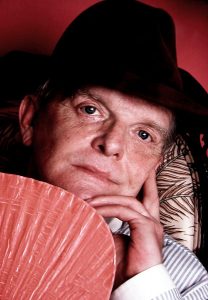 Hilton Als’ essay “The Women” is roughly about the author and filmmaker — and artist in many other senses — Truman Capote whose first book was published in 1947. Als stresses that this publication takes place “just when other ‘real’ women could not as freely enter the publishing world” (238). Als characterizes Capote as a woman because of the feminine voice and sensuality of his writing, as well as because of the topics he chose to write about. His book Other Voices, Other Rooms featured a photo of Capote on the back cover, which Als states was “something to be fucked somehow.” The qualities Als describes are Capote’s manicured hands and his intrigued expression or perhaps even the writing of other women (238). Als claims Capote never wrote as himself, and within the essay itself Als doesn’t write much about the mundane aspects of Capote’s life. This leaves only the parroted writing style and interviews for the readers to make assumptions about Capote as a person apart from his work.
Hilton Als’ essay “The Women” is roughly about the author and filmmaker — and artist in many other senses — Truman Capote whose first book was published in 1947. Als stresses that this publication takes place “just when other ‘real’ women could not as freely enter the publishing world” (238). Als characterizes Capote as a woman because of the feminine voice and sensuality of his writing, as well as because of the topics he chose to write about. His book Other Voices, Other Rooms featured a photo of Capote on the back cover, which Als states was “something to be fucked somehow.” The qualities Als describes are Capote’s manicured hands and his intrigued expression or perhaps even the writing of other women (238). Als claims Capote never wrote as himself, and within the essay itself Als doesn’t write much about the mundane aspects of Capote’s life. This leaves only the parroted writing style and interviews for the readers to make assumptions about Capote as a person apart from his work.
The essay is about a live subject, imagined people (characters), but the live subject seems to be a character himself by molding himself to fill the role of a woman writer as a male at a time when women writers were far and few between. Copote’s motivations are clear which is, he wants to be the most respected women writer and the best version of a women and to do this he attempts to take down other real women. He does so by infiltration, copying and underhanded compliments.
This caused me wonder personally who owns the female gender. It is clear the author is focused more so on sex(genitalia) than gender(social construct) in the beginning but towards the end it seems gender is at the forefront. Another thing I found intriguing is the duality of Capote’s image and how it seems he does not fully understand the extent of what he is projecting which brings me back to my orginal question who owns the female gender. If some aspects of physically acting out femininity came somewhat natural to Capote. Towards the end of his career after writing In Cold Blood he is sure he is the manliest man and states in interviews he feels this is a more honest representation of his writing. Was then image(facial expression) only an act but an expression that came more naturally to him than his writing? I am unsure of the answer myself but I believe it to be partly an act and partly natural. Actors don’t have clean slates and must start with some personal experience or else it does not seem organic to the audience.
The fragments of Capote’s writing as he wrote as “a woman” did not appear to me to be that of a woman. The comparison between his contemporaries and even then it did not seem emotionally genuine despite the talent he had. Capote is a character/real person that appears to be on a short emotional spectrum which I don’t believe I can say is ineffective because he isn’t entirely imagined in the mind of Als but an actual person. The most tender or perhaps vulnerable moment is at the very end when Capote and Bowles are having their photograph taken in Africa and Als wonders if he can totally make the split between himself and the female gender while in the presence of this actual female perfected. Als also questions if Capote would accept her however fleeting affection while the picture is being taken.